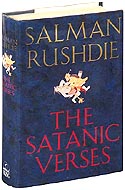The Indian government has always made pretentious claims about idealism and socialism, yet goes on banning books – a distortion of the freedom of expression – to claim their supremacy. About 20 books are officially banned in India currently, and imports of many others are denied by the customs department.
But are the bans really worth it? With greater permissiveness and social freedom, uncensored copies of the book are anyway floating freely on internet.
Indian writers and economists have said much harsher things. Yet, in all these years nobody has bothered to take them into consideration. Analysts from Reporters Without Borders rank India 131st in the world in terms in their Press Freedom Index, falling from 80th just 11 years earlier. Here are top 5 books that are censored in India.
 1) The Satanic Verses
1) The Satanic Verses
Amongst the oldest, yet youngest controversy as is evident from incidences of Jaipur literature festival. India was the first Country to ban the Book following the hostile response from the Muslims all over the Globe. He has been in a hiding for over a decade. Fatwa was imposed on Rushdie by Iran’s Supreme Leader Ayatollah Khomeini for demeaning Islam. Rushdie had to live in hiding for nearly a decade.
2) The Great Soul
Joseph Lelyveld, the Pulitzer Prize winner and former executive editor of The New York Times penned a biography, “The Great Soul”, inspired by Gandhi’s life in India and South Africa. The reviews claimed that the book exposed Gandhi’s sexual life and bigoted views. Reacting to it, the book was called for a ban in Gujarat, Gandhi’s hometown has. But imposition of nationwide ban was abjured, citing Lelyveld’s clarification. Still book is not let inside India by customs department.
3) Nine Hours to Rama
Nine Hours to Rama written by historian Wolpert, a professor at University of California. This book is a fictional account of last day of Gandhiji’s lije and focuses on how Nathuram Godse planned Mahatma Gandhi’s assassination. It got banned because it exposed the poor security provided to Gandhi, and hinted at possible incompetence and conspiracy.
4) Lady Chatterley’s Lover
“Lady Chatterley’s Lover” by D.H. Lawrence was considered as obscene because it was an account of a women’s illegitimate relationship with her Gardner. It has depiction of sex and politics gave rise to controversies and was unanimously banned in India and Britain (though Britain lifted up the ban). But the ban is not followed as it should be and you can find books in some stored. The court said that the court does not protect those who take delight in “sexual pleasures and erotic writings”.
 5) The Polyester Prince
5) The Polyester Prince
Australian journalist Hamish McDonald wrote this account of Ambani’s rise in 1998, which remained unavailable in India, partly because of concerns that Ambani would sue if the book got released. The books asserted that many of the rules and regulations were turned down to serve his purpose. An updated version” Ambani and Sons”, was written down which is available in book stores.


